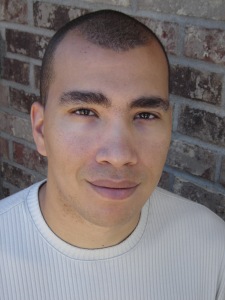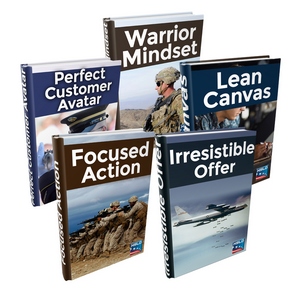 Charlie Gilkey is the Founder of Productive Flourishing and Author of The Small Business Life Cycle, a best selling book on small business planning.
Charlie Gilkey is the Founder of Productive Flourishing and Author of The Small Business Life Cycle, a best selling book on small business planning.
His speeches, classes and planning systems and body of work helps change makers start finishing the stuff that matters.
Charlie lives with his wife Angela in Portland, Oregon.
HSLD: Besides the little background that we’ve give about you, could you tell us a little more about yourself?
Charlie: It can be hard to explain what I do in Productive Flourishing to veterans.
All that stuff that you learn in the military about leadership, planning and getting stuff done, all of that can be repurposed to help you in the civilian world.
I have been fortunate enough to have learned and tap into all those as a skillset and have used it to convert my business which is Productive Flourishing. I am the go to guy when you want to get something done but don’t know how quite to do it.
Prior to the business, in the military, I was a joint force military statistics coordinator. Now I work with creative people and I love it.
Click here to listen to the Itunes version of the HSLD podcast featuring Charlie Gilkey
Click here to listen to the Stitcher version of the HSLD podcast featuring Charlie Gilkey
HSLD: Let’s start with your success quote. What is it?
Charlie: This one is by Conrad Hilton.
“ Success seems to be connected by action. Successful people keep moving. They make mistakes, but they don’t quit”
HSLD: Let’s focus on your military experience. Tell us a story of your most pivotal moment in the US army and share with us some of the lessons you learned.
Charlie: I was on my second tour as staff officer. I’m the kind fo guy that really loves staff because I have always been a planner and strategist. I had already had my command tour and many of us know that is the best thing.
It was a pivotal and long period of time. One job that really stands out to me was when I was designing a joint force multi training environment. It was largely training people how to do combat logistics the real way.
We were involved in this operation and for one reason or the other the black hawk that we pulled down, well it’s GPS was busted. That left me stumped because we had never been in a situation when the people on the ground knew more than us.
I thought for a minute and then there was this guy who was also part of the whole thing. He had done everything right and was clearly frustrated because the black hawk couldn’t find us.
So I thought to decided to use some techniques that were normally used for artillery. All of this was quite normal to me. Now this guy was just looking at me, wide eyed and asked me how I learned how to do what I was doing.
I said, “Well, its just a different technique for getting somewhere where it needs to be.” And he said, “No one had ever told me that that was a way that I could do my job.” Although we were frustrated, that little thing opened up a world of possibilities in his world for him to be an even better soldier and even at doing his job.
It was one of those moments that really show that as leaders we can really show the people that follow us a whole realm of possibilities.
HSLD: Let’s focus on your transition out and the failures, challenges and lessons you got from it.
Charlie: I was working in one of those three-quarter jobs with the army national guard. The biggest transition was going from a deployed soldier to coming back to the country.
That particular transition was interesting because I was completing my PHD at that time and made a conscious decision to go to Iraq.
As it turns out that may not have been the best thing to do because I was teaching philosophy, but also doing work full time as a soldier.
It was a bout a year before I really got to see changes. One of the biggest changes is that to be successful overseas, you have to learn to go meal to meal. While that works great in that context it is different in the civilian world because you have to think beyond that.
You have to think where something is taking you or what you need in a few months.
Charlie: It took me a few months to realize that the way I lived my life overseas was not appropriate for the life I currently had. It dawned on me that I had to change my life around so that I’m not just playing meal per meal but see my life as a marathon.
HSLD: What would you want to tell that person who was transitioning out?
Charlie: When you’re in the military, someone tells you what needs to be done and you do it.
But when you’re a life strategist, you have to define that deeper inner mission.
Figure out where you want to go and what matters to you. You have to think about what hardships you need to endure and what you have to do to be successful.
HSLD: How did you get to where you are now?
Charlie: I fell into what I am doing now accidentally. I used to do a lot of translational teaching.
I noticed I had all of this experience and expertise from the military side and I also had this academic site. I had all of this drive so these three swirling things and was reading all sorts of books and translating stuff.
One day I said, “If I’m already translating stuff, why don’t I do this too, why should I let people do all of the work?! And that’s why Production Flouring started.
It started picking up. Entrepreneurs started to approach me and ask questions and then people wanted to start hiring me. I then realized that I could get paid doing this.
I now work with businesses that start their takeoff face and they are either stuck or a going through a lot of growing pains. I help them make the right choices.
Charlie’s Lighting Round Answers
- What is the most difficult adjustment you had to make to the civilian world? Not having someone to give me a mission and having to define what that mission was for myself.
- What is the best business advice that you can pass along to people that are making their transition now? Use everything. Fail fast, fail often. Wake up the next day and go through everything again.
- What is one of your habits that you believe contribute to your success? I wake up early.
- What is the biggest generalization that you had to overcome in the civilian world? You have to specialize. That’s not true.
- If you can recommend one book what would it be? The Dip by Seth Godin.
- What’s the best way that we can find you? Remember that you can leverage success but you can’t leverage “I’m going to.” You can find me at Productiveflourishing.com and at @Charliegilkey.
Click here to listen to the Itunes version of the HSLD podcast featuring Charlie Gilkey
Click here to listen to the Stitcher version of the HSLD podcast featuring Charlie Gilkey

